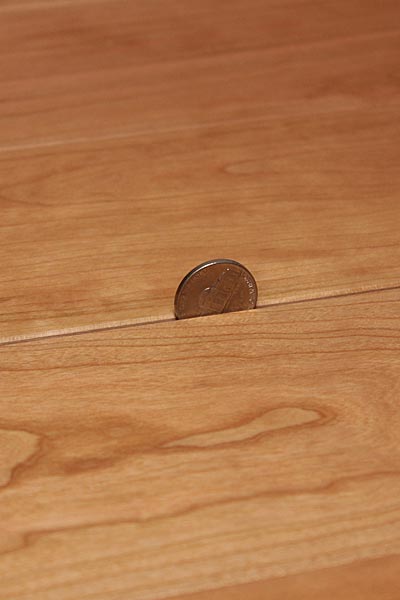The gaps we all want to know about.
We get these questions often, “Why do hardwood floors get gaps and cracks? Gaps? Why do we have gaps?”
During the winter months, complaints usually start trickling in. Often, it’s a floor owner concerned with new hardwood floors separating or gapping: “They weren’t there in the summer.” Solid 3/4″ hardwoods will expand and contract with seasonal changes in moisture. This is especially noticeable with site finished floors whose final appearance after the work has been done is near flawless.

Gapping occurs when wood floors lose their moisture content. Several factors can lead to their cause. By examining it from a layman’s view; even though the hardwood is no longer living and growing, it contains cells that still take on and lose moisture with changes in relative humidity. The example to the right shows a nickel-sized gap.
Often gapping is a result of flooring that was installed during periods of higher humidity. Months may pass, even years, depending on the conditions until gapping becomes evident. A few unusually warm winters without the extensive use of heating in the home may not show the potential. Conversely, extremely cold winter months will require more heating. When dry air is forced into the environment, Moisture is removed from not only the environment but also the cells or pores of the hardwood so contraction occurs.
How much gapping is dependent on several factors: Solid wider width boards will show more while narrow strip floors can show less. Methods to reduce gapping include the use of furnace humidifiers. These products work principally by evaporation of water that is introduced into the environment through the heating system. With more moisture in the air, cells in hardwoods begin to expand.
When is the Best Time To Install Floors?
Unfortunately, as a builder with timelines to get clients into the home as soon as possible, we can’t always wait for the best times, but often a myriad of opinions can be found on this subject. Most professionals agree that finding the average humidity level in the home year-round will reduce contraction and minimizing gapping. It’s also vital that the actual installation and acclimation period be close to this level to achieve the best results. No matter what time of year you install Hot Air Furnaces without Humidifiers will dry out your floor, and cause gapping.
What Filler Will Fix My Gapped Floors? How?
Unfortunately, no filler will work effectively unless the humidity level is kept constant. During the expansion process when warmer days allow for houses to be open to outside air, gapping will close up as the wood flooring takes on moisture and the filler eventually gets squeezed out.
For very wide more permanent gapping, gluing rope with a urethane adhesive between boards has been successful. Caution should be exercised here as glues can stain and become rather noticeable once the floor is finished. Wiping clean with a rag and mineral spirits is suggested prior to the application of any finish.
Given Up? Engineered Floors Can Be The Answer
Situations with gapping floors are a solid hardwood problem. Seldom does it occur with engineered floors. Engineered hardwoods were created for more stability in the way they are manufactured. Builders and hardwood professionals are taking notice of the benefit. We’re seeing more being used especially in colder climates.
For more information, we invite you to reach out to Noah Construction & Builders today! You can call us at 631-750-2837 or visit our website for more information.




